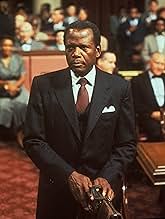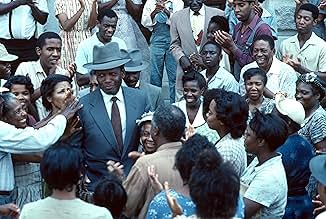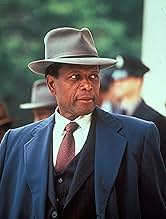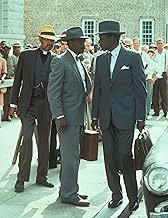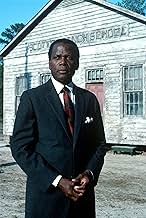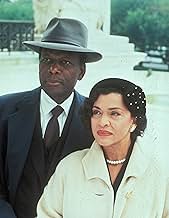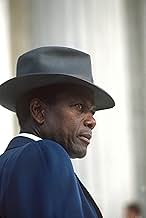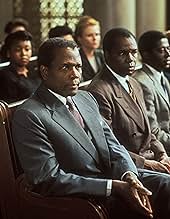Ajouter une intrigue dans votre langueA dramatization of the American court case that destroyed the legal validity of racial segregation.A dramatization of the American court case that destroyed the legal validity of racial segregation.A dramatization of the American court case that destroyed the legal validity of racial segregation.
- Récompensé par 2 Primetime Emmys
- 3 victoires et 12 nominations au total
Parcourir les épisodes
Avis à la une
10Vegita
Separate but Equal is a great movie depicting the tragedy of the time of racial segregation in schools and the steps which these men from the NAACP took to correct it. The movie has great acting and intense speech emotion but sinks into the wordiness and vocabulary which lawyers and judges use and leaves the audience scratching their heads or reading the dictionary. Nevertheless, the movie has great speeches and facts as well as events suitable in a history-documentary. Great movie to sit by and try to teach yourself to be a lawyer.
It's the dramatization of the case Brown v. Board of Education. It starts with a need for a bus and ends with the finish of segregation. This is a two-part series totalling three hours of television. Sidney Poitier plays NAACP lawyer Thurgood Marshall who would go on to become a Supreme Court judge.
I am not always a fan of courtroom dramas especially when the result is already known. The court case part may be informative but not the most dramatic. It is everything around the court case that is truly fascinating. The plaintiffs' stories are interesting. Nowadays, this case is taken as a given, but it's not a given at the time. This is educational and sometimes compelling TV.
I am not always a fan of courtroom dramas especially when the result is already known. The court case part may be informative but not the most dramatic. It is everything around the court case that is truly fascinating. The plaintiffs' stories are interesting. Nowadays, this case is taken as a given, but it's not a given at the time. This is educational and sometimes compelling TV.
The usually restrained Sidney Poitier really hams it up during his courtroom speeches (was Thurgood Marshall that dynamic?) but is excellent anyway. And the little seen Gloria Foster, superb as the Oracle in "The Matrix", is wonderful as Marshall's ailing wife. Educational, semi-documentary, but good stuff.
`John, if this case goes before the Supreme Court. . . I'm gonna need you'
It's the early 1950's, in America. The governor of South Carolina (James Francis Byrnes), in his 70's at the time, pays a visit to his friend, the famous John W. Davis. Davis had argued 138 cases in front of the Supreme Court. Byrnes was turning to him for help.
Byrnes was determined to show that discrimination and segregation of public schools were not the same thing. He wanted black school children to have equal schools. He was ashamed of the terrible condition the black schools were in, in his state of South Carolina. He even levied a three percent sales tax to fund the improvement of black schools. He was prepared to spend 75 million dollars to improve the public schools for black children in his state.
But he knew, that the small case that a few courageous people (Harry Briggs, Reverand J.A. Delaine) had started in Clarendon county, SC, was too big of an issue for his efforts alone. The case was on it's way to the Supreme Court of the United States of America.
The National Association for the Advancement of Colored People (the NAACP), had become involved. Their head lawyer, Thurgood Marshall had combined this case and 4 other similar cases (from Delaware, Kansas, DC and Virginia) into one called 'Brown v. Board of Education', and made it his mission to strike down segregation in public schools in America.
The great thing about this movie is how it makes each side look respectable. The movie does not make this a 'bad evil white men against poor suffering black people' type of story. But rather, the film, portrays the white men as being highly respected, educated and willing to do the right thing. But at the same time, very concerned and perhaps even afraid of the consequences of their decisions.
I also loved the humor in this film. For example when Byrnes is conversing with Davis and says 'I admit to past sins, our colored schools are a disgrace'. Or when one of the lawyers at the NAACP legal defense fund says about the South Carolina case "If we win this one, we'll only have 11,172 school districts left"
The heart of this film is the uncommon courage of the people. Courage among so many involved. Of course, first from the blacks from those small towns, who risked their jobs and safety, and faced the hate of the Ku Klux Klan, by taking these complaints to their local lawyers. Then, to the NAACP, for climbing this long and expensive uphill battle. But also, to the judges on the Supreme Court, and in particular the Chief Judge Earl Warren.
Warren was quoted as saying 'Everything that I did in life that was worthwhile, I caught hell for'. What a difficult decision, but what a remarkable effort on his part to unite the nine members of the Supreme Court to conclude the case with a unanimous decision to end segregation in public schools in America.
It took a lot of brave people on both sides, to end separation of black and white school children in public schools. Perhaps Thurgood Marshall summed it up best, when he mocked the thinking of people in the south by saying 'you can have them attending the same State Universities and Graduate schools, but if they attend the same elementary and high schools together, the world would fall apart.'
A wonderful treasured movie. Must see for all.
It's the early 1950's, in America. The governor of South Carolina (James Francis Byrnes), in his 70's at the time, pays a visit to his friend, the famous John W. Davis. Davis had argued 138 cases in front of the Supreme Court. Byrnes was turning to him for help.
Byrnes was determined to show that discrimination and segregation of public schools were not the same thing. He wanted black school children to have equal schools. He was ashamed of the terrible condition the black schools were in, in his state of South Carolina. He even levied a three percent sales tax to fund the improvement of black schools. He was prepared to spend 75 million dollars to improve the public schools for black children in his state.
But he knew, that the small case that a few courageous people (Harry Briggs, Reverand J.A. Delaine) had started in Clarendon county, SC, was too big of an issue for his efforts alone. The case was on it's way to the Supreme Court of the United States of America.
The National Association for the Advancement of Colored People (the NAACP), had become involved. Their head lawyer, Thurgood Marshall had combined this case and 4 other similar cases (from Delaware, Kansas, DC and Virginia) into one called 'Brown v. Board of Education', and made it his mission to strike down segregation in public schools in America.
The great thing about this movie is how it makes each side look respectable. The movie does not make this a 'bad evil white men against poor suffering black people' type of story. But rather, the film, portrays the white men as being highly respected, educated and willing to do the right thing. But at the same time, very concerned and perhaps even afraid of the consequences of their decisions.
I also loved the humor in this film. For example when Byrnes is conversing with Davis and says 'I admit to past sins, our colored schools are a disgrace'. Or when one of the lawyers at the NAACP legal defense fund says about the South Carolina case "If we win this one, we'll only have 11,172 school districts left"
The heart of this film is the uncommon courage of the people. Courage among so many involved. Of course, first from the blacks from those small towns, who risked their jobs and safety, and faced the hate of the Ku Klux Klan, by taking these complaints to their local lawyers. Then, to the NAACP, for climbing this long and expensive uphill battle. But also, to the judges on the Supreme Court, and in particular the Chief Judge Earl Warren.
Warren was quoted as saying 'Everything that I did in life that was worthwhile, I caught hell for'. What a difficult decision, but what a remarkable effort on his part to unite the nine members of the Supreme Court to conclude the case with a unanimous decision to end segregation in public schools in America.
It took a lot of brave people on both sides, to end separation of black and white school children in public schools. Perhaps Thurgood Marshall summed it up best, when he mocked the thinking of people in the south by saying 'you can have them attending the same State Universities and Graduate schools, but if they attend the same elementary and high schools together, the world would fall apart.'
A wonderful treasured movie. Must see for all.
When making a film about the historic Brown vs. Board of Education case, who would be the obvious choice to play civil rights icon Thurgood Marshall? If you answered Sidney Poitier, you agreed with the casting director of Separate But Equal. The movie chronicles the journey in the 1950s for racial equality and desegregation in the school system.
In his final film, Burt Lancaster plays John W. Davis. Richard Kiley plays Chief Justice Earl Warren, and he—and Sidney—were nominated for Golden Globes that year. Joining the supporting cast are Cleavon Little, Gloria Foster, John McMartin, Graham Beckel, and Lynne Thigpen. George Stevens Jr.'s script is something to be admired, since he tried very hard to make it historically accurate and interesting to television audiences. It's not the best American history movie ever made, and it's certainly not a good choice if you've never seen a Sidney Poitier or Burt Lancaster movie, but if you know your history and want to watch a three-hour tribute to this slice of Americana, go ahead and rent it. It does feel pretty cheesy at times, and Sidney Poitier tends to overact more often than not in his scenes, but overall, it's a great movie for high school students to watch as an addendum to their curriculum.
In his final film, Burt Lancaster plays John W. Davis. Richard Kiley plays Chief Justice Earl Warren, and he—and Sidney—were nominated for Golden Globes that year. Joining the supporting cast are Cleavon Little, Gloria Foster, John McMartin, Graham Beckel, and Lynne Thigpen. George Stevens Jr.'s script is something to be admired, since he tried very hard to make it historically accurate and interesting to television audiences. It's not the best American history movie ever made, and it's certainly not a good choice if you've never seen a Sidney Poitier or Burt Lancaster movie, but if you know your history and want to watch a three-hour tribute to this slice of Americana, go ahead and rent it. It does feel pretty cheesy at times, and Sidney Poitier tends to overact more often than not in his scenes, but overall, it's a great movie for high school students to watch as an addendum to their curriculum.
Le saviez-vous
- AnecdotesThis was Burt Lancaster's final performance. On November 30, 1990, shortly after filming ended, he suffered a massive stroke and remained incapacitated for the final four years of his life.
- GaffesThe entire movie is set in the 1950s, but in at least one of the New York City street scenes, both the pedestrians' clothing and the cars on the street appear to date from the late 1960s to the 1970s.
- ConnexionsFeatured in The 43rd Annual Primetime Emmy Awards (1991)
Meilleurs choix
Connectez-vous pour évaluer et suivre la liste de favoris afin de recevoir des recommandations personnalisées
- How many seasons does Separate But Equal have?Alimenté par Alexa
Détails
Contribuer à cette page
Suggérer une modification ou ajouter du contenu manquant


